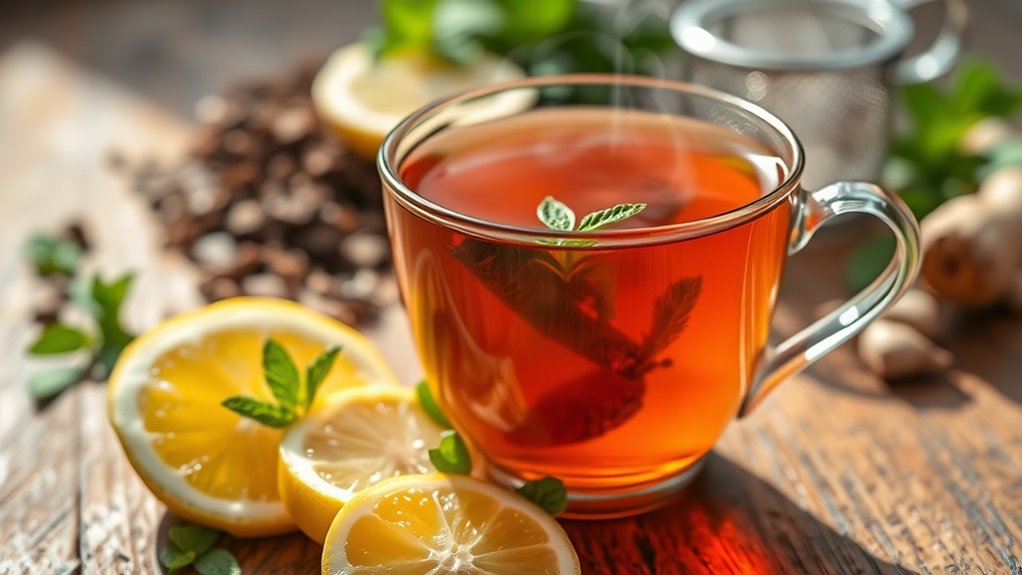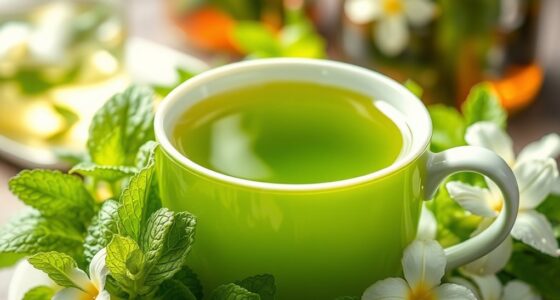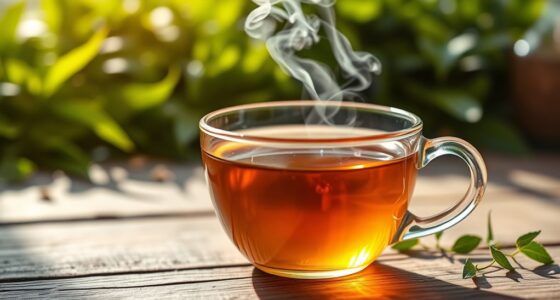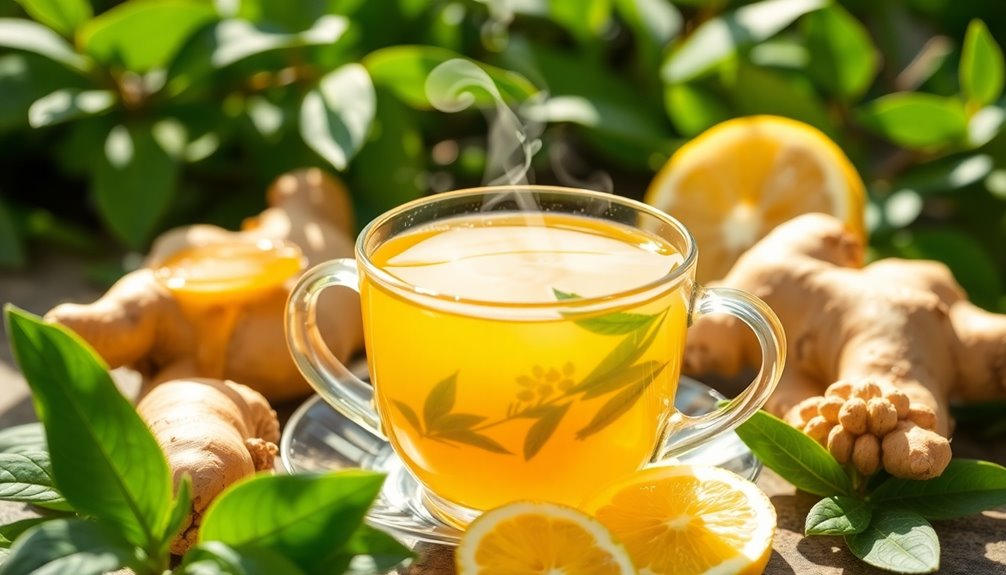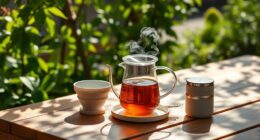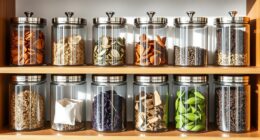To boost your immune system, choose herbal teas with ingredients like echinacea, elderberry, ginger, and turmeric. These herbs are known for their antiviral, anti-inflammatory, and antioxidant properties. Prepare them by steeping fresh or dried herbs at the right temperature for the recommended time to release their full benefits. Adding honey, lemon, or black pepper can enhance absorption and flavor. Keep exploring to discover more tips for maximizing your herbal tea benefits.
Key Takeaways
- Herbal teas with echinacea, elderberry, ginger, and turmeric are highly effective for boosting immunity.
- Proper steeping times and temperatures maximize the extraction of active medicinal compounds.
- Adding honey, lemon, or black pepper enhances flavor and absorption of immune-boosting herbs.
- Consistently consuming high-quality herbal teas supports overall immune health and resilience.
- Combining herbs in teas can create synergistic effects for stronger immune support.
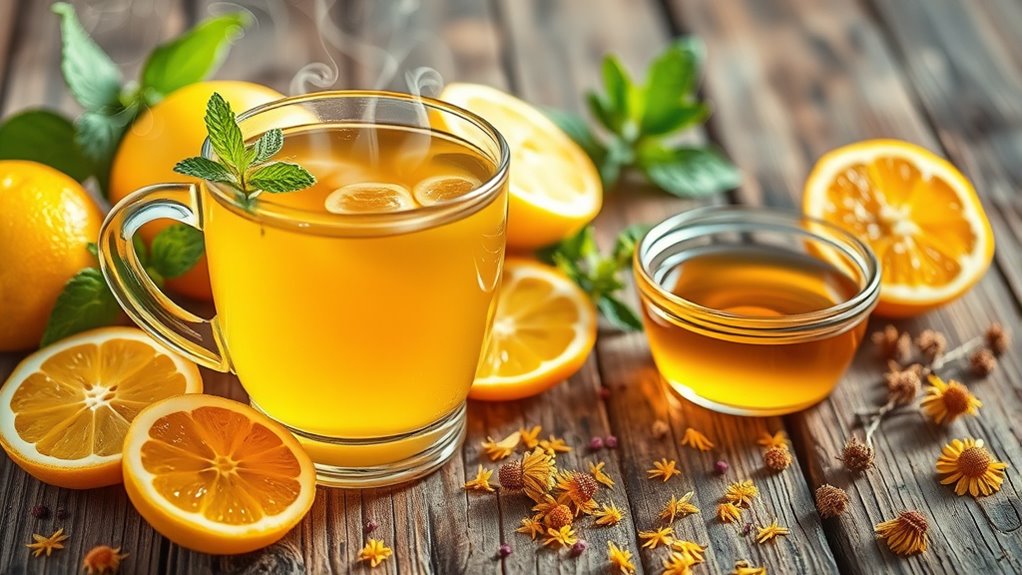
When your immune system needs a boost, choosing the right tea can make a noticeable difference. Herbal remedies have been used for centuries to support immunity, and certain teas stand out for their health-boosting properties. The key is not just what you drink, but how you prepare it. Knowing the best tea preparation methods ensures you extract the maximum benefits from your herbal remedies.
Choosing the right herbal tea and proper brewing methods can significantly boost your immune health.
To start, selecting high-quality herbs is vital. For immune support, herbs like echinacea, elderberry, ginger, and turmeric are popular choices. Echinacea tea is well-known for its ability to reduce the duration of colds and flu. When preparing echinacea tea, steep dried echinacea flowers or leaves in hot water for about 10 minutes. Using fresh herbs can intensify the flavor and potential benefits, but dried herbs work well too. Remember, herbal remedies are most effective when you follow proper tea preparation methods, such as steeping at the right temperature and time, to reveal their full medicinal potential.
Ginger tea is another excellent option. It has anti-inflammatory and antioxidant properties that support your immune system. To make ginger tea, peel and slice fresh ginger root, then steep it in boiling water for 10-15 minutes. Adding a dash of honey and lemon can enhance flavor and provide additional health benefits. Turmeric, with its active compound curcumin, also boosts immunity. To prepare turmeric tea, simmer fresh or powdered turmeric with black pepper (to increase absorption) in water for about 10 minutes. Strain and enjoy. Incorporating these herbal remedies into your routine can strengthen your defenses against illnesses.
Elderberry tea is praised for its antiviral effects. You can find dried elderberries or elderflower in herbal stores. To prepare elderberry tea, steep the dried berries or flowers in hot water for 15-20 minutes. Because elderberries contain compounds that can be potent, always verify they are properly prepared and consumed in moderation. Using the right tea preparation methods—like covering the pot while steeping and not boiling the herbs for too long—helps preserve their beneficial compounds.
Additionally, choosing herbs with known WWE Raw’s Financial Impact benefits can help you enjoy both health and entertainment. Consistently using these herbal remedies, combined with proper tea preparation methods, makes your immune-boosting efforts more effective. Remember, the quality of the herbs and the way you brew them directly influence the potency of your tea. Whether you prefer a simple ginger infusion or a complex herbal blend, paying attention to preparation details will guarantee you get the most out of each cup. With mindful choices and proper techniques, your teas can become powerful allies in maintaining your health and fighting off illnesses.
Frequently Asked Questions
Can Tea Help Prevent Common Colds?
Yes, tea can help prevent common colds by providing herbal antioxidants that strengthen your immune system. Drinking tea regularly, especially varieties like echinacea or ginger, supports cold prevention by reducing inflammation and fighting off viruses. You should incorporate these teas into your routine to boost your defenses naturally. While tea isn’t a guaranteed cure, its antioxidants and soothing properties make it a helpful addition to your cold prevention strategy.
How Often Should I Drink Immune-Boosting Tea?
Like the steady beat of a metronome, maintaining consistent tea consumption habits supports your immune health. You should drink immune-boosting tea daily, ideally 2-3 cups, to maximize benefits without overdoing it. This ideal intake frequency helps sustain your body’s defenses and keeps you resilient. Remember, moderation is key—regular, moderate tea drinking is more effective than sporadic, excessive consumption.
Are There Any Side Effects of These Teas?
Yes, these teas can have side effects. You might experience potential allergic reactions if you’re sensitive to certain ingredients like herbs or spices. Additionally, some immune-boosting teas contain caffeine, which could cause issues if you’re caffeine-sensitive, leading to jitters or sleep problems. Always check ingredient lists and start with small amounts to see how your body reacts before consuming regularly. Consulting a healthcare professional is also recommended if you have concerns.
Do Herbal Teas Work Better Than Traditional Teas?
Herbal teas often provide specific herbal benefits, like antioxidants and anti-inflammatory properties, which can support your immune system. Traditional teas, such as green or black, contain antioxidants and caffeine that boost alertness and overall health. While herbal teas may target particular health concerns more directly, traditional teas offer proven advantages like improved focus and cardiovascular health. Both can be effective, so choose based on your specific needs and preferences.
Can Children Safely Consume Immune-Boosting Teas?
Think of children’s safety as a delicate garden that needs careful tending. You can give immune-boosting teas to kids, but always consider dosage considerations and consult a healthcare professional first. Some herbs may be gentle enough, but others might cause adverse reactions. Keep their safety in mind, use age-appropriate amounts, and monitor for any side effects. When in doubt, prioritize natural foods and consult experts to nurture their health.
Conclusion
While many teas offer immune-boosting benefits, don’t forget that a balanced diet and good sleep matter just as much. Think of tea as your daily armor—powerful yet incomplete without a healthy lifestyle. So, sip your favorite brew, but remember, true immunity comes from consistent habits. Combining these teas with proper care creates a shield stronger than any single cup. Stay mindful, stay healthy, and let your tea be just one part of your wellness journey.

